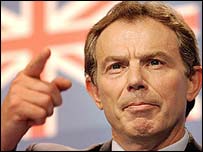
Blair says the charges are totally
untrue |
A
dossier including the claim that Iraq could launch weapons of mass
destruction in 45 minutes was repeatedly returned to intelligence
chiefs for changes, the BBC has learned.
A source close to British intelligence has told BBC diplomatic
correspondent Barnaby Mason that Downing Street returned draft
versions of the dossier to the Joint Intelligence Committee "six to
eight times".
He said Prime Minister Tony Blair was involved in the process at
one point.
Mr Blair has vigorously denied that the document was "sexed up"
in order to garner support for war.
 They have debased their own credibility
by only issuing denials They have debased their own credibility
by only issuing denials 
|
The prime minister is under pressure over the way the government
made the case for war in Iraq, with coalition forces yet to find
weapons of mass destruction.
The chief UN weapons inspector Hans Blix returned to the UN
Security Council on Thursday to present what may be his final report
before his retirement.
He said Iraq had left "many unanswered questions" about its
unconventional weapons, but this did not mean such dangerous arms
still existed.
The first of 1,400 military experts have now arrived in Iraq to
begin a new search for evidence of weapons of mass destruction.
Confidence
Responding to Barnaby Mason's report, Mr Blair's office again
said no pressure had been put on the intelligence services to change
the document.
Mr Blair said on Wednesday he was confident the UN team, from the
US, UK and Australia, would find signs of the nuclear, chemical or
biological weapons.
"I have absolutely no doubt at all that they will find the
clearest possible evidence of Iraq's weapons of mass destruction,"
he said.
But a former senior intelligence official in the US state
department, Greg Thielman, said he thought evidence had been
distorted - a charge also denied by the Bush administration.
Tory leader Iain Duncan Smith repeated his call for a full
independent inquiry into whether intelligence documents on Iraq's
weapons were changed on the orders of Downing Street to strengthen
the case for military action.
'Debased credibility'
He accused Commons leader John Reid of "debasing the credibility
the government was standing on" by claiming "rogue elements" in the
security services were briefing against the government.
"The government needs the British people to be able to believe,
as we do, that they took decisions on the basis of intelligence that
was right and that at the end of the day we can believe that
intelligence," he told BBC Radio 4's Today programme.
"They have debased their own credibility by only issuing
denials."
Former Labour chancellor Lord Healey has said Mr Blair should
resign if he is wrong about weapons of mass destruction (WMD).
 There have been uncorroborated briefings
by a potentially rogue element There have been uncorroborated briefings
by a potentially rogue element 
Dr John Reid
Leader of the Commons
|
On Wednesday the Lib Dems, backed by the Tories, were defeated in
a motion calling for a judicial inquiry into the matter, by 301
votes to 203.
Mr Blair again insisted it was "completely and totally untrue"
that a dossier had been "sexed up".
But he said he would allow the all-party intelligence and
security committee (ISC) to conduct an inquiry into the row.
|
Do MPs feel misled about Iraq's weapons of mass
destruction? ![]()
|
Mr Blair said the disputed claim over Iraqi weapons strikes
within 45 minutes was entirely the work of the JIC.
But another military source, said to be "intimately involved" in
the compilation of the dossier, told BBC2's Newsnight programme he
had been "uneasy" with the 45-minute claim.
The source, who the programme said could not be described as a
"rogue element", believed the emphasis placed on the claim had
turned a possible capability into an imminent threat.
But he did not dispute the assertion that the intelligence
services had put the claim into the dossier.
MPs on the influential foreign affairs select committee have
already said they are to investigate the way the government
presented intelligence information over Iraq's weapons.
Former foreign secretary Robin Cook said while he gave "two
cheers" to the two investigations, he would have preferred "a more
open and transparent inquiry", conducted by somebody from outside
politics.
Commons leader Dr John Reid stirred up the row further on
Wednesday, saying "rogue elements" in the intelligence services were
briefing against the government.
